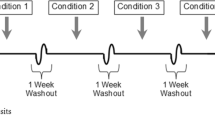Summary
Nutrient intakes and selected blood and urinary constituents of 16 Navy servicemen were obtained before and during a period of 113 hours of physical activity, sleep deprivation, and psychological stress, to document the dietary adaptation of physically conditioned men to an extended period of hard physical work and other stresses. Food intakes were monitored by 1-day diet records prior to and by direct observation during the period. The factorial method was used to calculate energy expenditure. Carbohydrates provided 45 and 43% of the total energy intake before and during the experiment. Protein intakes and intakes of all the vitamins and minerals studied exceeded the Recommended Dietary Allowances, both before and during the period. Total energy intake averaged 18.7 MJ · d−1 before and 24.4 MJ · d−1 during the experiment. Body weight increased significantly by 2.7±0.4 kg (mean±s.e.) during the experiment (p< 0.0001). There was a significant correlation (r=0.74; p<0.001) between the change in body weight and urinary sodium from before to after the experiment suggesting that increased dietary sodium may have contributed to the weight gain. A significant increase in plasma volume (11.9±3.2%; p< 0.0003) provided further support that the observed weight gain was due to sodium intake rather than a positive energy balance. In conclusion, conditioned men increased food consumption adequately to meet increased energy demands.
Similar content being viewed by others
References
Aakvaag A, Bentdal O, Quigstad K, Walstad P, Ronningen H, Fonnum F (1978) Testosterone and testosterone binding globulin in young men during prolonged stress. Int J Androl 1:22–31
Acheson K, Campbell I, Edholm O, Miller D, Stock M (1980) The measurement of daily energy expenditure — an evaluation of some techniques. Am J Clin Nutr 33:1155–1164
Allen T, Peng M, Chen K, Huang T, Chang C, Fang H (1956) Prediction of blood volume and adiposity in man from body weight and cube of height. Metabolism 5:328–343
Barnes L, Strauss R (1986) The US Navy Seal team: total commitment to total fitness. Phys Sportsmed 14:176–183
Brotherhood J (1984) Nutrition and sports performance. Sports Med 1:350–389
Costill D, Cote R, Miller E, Miller T, Wynder S (1975) Water and electrolyte replacement during repeated days of work in the heat. Aviat Space Environ Med 46:795–800
Costill D, Sherman W, Fink W, Maresh C, Witter M, Miller J (1981) The role of dietary carbohydrate in muscle glycogen resynthesis after strenuous running. Am J Clin Nutr 34:1831–1836
Dill D, Costill D (1974) Calculation of percentage changes in volumes of blood, plasma, and red cells in dehydration. J Appl Physiol 37:247–248
Durnin J, Passmore R (1967) Energy, work, and leisure. Heinemann Educational Books, Ltd, London
Ferro-Luzzi A, Venerando A (1978) Aims and results of dietary surveys on athletes. In: Parizkova J, Rogozkin V (eds) Nutrition, physical fitness, and health. University Park Press, Baltimore, pp 145–154
Hodgdon J, Beckett M (1984) Prediction of percent body fat for U.S. Navy men from body circumferences and height. NMRDC Report no 84-11
Johnson H, Krzywicki H, Canham J, Skala J, Daws T, Nelson R, Consolazio C, Waring P (1976) Evaluation of caloric requirements for ranger training at Fort Benning, Georgia. U.S. Army LAIR Institute Report no 34
Khoo C, Rawson N, Robinson M, Stevenson R (1987) Nutrient intake and eating habits of triathletes. Ann Sports Med 3:144–150
Kirsch K, von Ameln H (1981) Feeding patterns of endurance athletes. Eur J Appl Physiol 47:197–208
Laritcheva K, Yalovaya N, Shubin V, Smirnov P (1978) Study of energy expenditure and protein needs of top weight lifters. In: Parizkova J, Rogozkin V (eds) Nutrition, physical fitness and health. University Park Press, Baltimore pp 155–163
Maxwell M, Kleeman C (1980) Clinical disorders of fluid and electrolyte metabolism. McGraw-Hill, New York pp 89–90
McArdle W, Katch F, Katch V (1986) Exercise physiology: energy, nutrition, and human performance. Lea and Febiger, Philadelphia pp 642–649
National Research Council (1980) Food and nutrition board: recommended dietary allowances. 8th ed. National Academy of Sciences, Washington
Plyley M, Shephard R, Davis G, Goode R (1987) Sleep deprivation and cardiorespiratory function: influence of intermittent submaximal exercise. Eur J Appl Physiol 56:338–344
Rahe R, Arthur R (1967) Stressful underwater demolition training: serum urate and cholesterol variability. JAMA 202:1052–1054
Revised Agriculture Handbook (1985) No. 8 Series (1–9). Science and Education Administration, U.S. Department of Agriculture, Government Printing Office, Washington D.C.
Shils M (1978) Food and nutrition relating to work, exercise and environmental stress. In: Goodhart R, Shils M (eds) Modern nutrition in health and disease. Lea and Feriger, Philadelphia, pp 814–851
Steel J (1970) A nutritional study of Australian Olympic athletes. Med J Austral 2:119–123
Author information
Authors and Affiliations
Rights and permissions
About this article
Cite this article
Smoak, B.L., Singh, A., Day, B.A. et al. Changes in nutrient intakes of conditioned men during a 5-day period of increased physical activity and other stresses. Europ. J. Appl. Physiol. 58, 245–251 (1988). https://doi.org/10.1007/BF00417257
Accepted:
Issue Date:
DOI: https://doi.org/10.1007/BF00417257



